Lyndall Gordon (born 4 November 1941) [1] is a British-based biographical and former academic writer, known for her literary biographies. She is a senior research fellow at St Hilda's College, Oxford. [2]
Born in Cape Town, she had her undergraduate studies at the University of Cape Town and her doctorate at Columbia University in New York City. She is married to pathologist, Siamon Gordon; they have two daughters.[ citation needed ]
Gordon is the author of Eliot's Early Years (1977), which won the British Academy's Rose Mary Crawshay Prize; [3] Virginia Woolf: A Writer's Life (1984), which won the James Tait Black Memorial Prize; Charlotte Brontë: A Passionate Life (1994), winner of the Cheltenham Prize for Literature; and Vindication: A Life of Mary Wollstonecraft , shortlisted for the BBC Four Samuel Johnson Prize. Her most recent publications are Lives Like Loaded Guns: Emily Dickinson and her Family's Feuds (2010), which has challenged established assumptions about the poet's life; [4] Shared Lives: Growing Up in 50s Cape Town (D. Philip Publishers, 1992); Divided Lives: Dreams of a Mother and a Daughter (London: Virago, 2014); and Outsiders: Five Women Writers Who Changed the World (London: Virago, 2017).
Gordon's most recent work is The Hyacinth Girl: T.S. Eliot’s Hidden Muse (2022).[ citation needed ]

A Vindication of the Rights of Woman: with Strictures on Political and Moral Subjects (1792), written by British philosopher and women's rights advocate Mary Wollstonecraft (1759–1797), is one of the earliest works of feminist philosophy. In it, Wollstonecraft responds to those educational and political theorists of the eighteenth century who did not believe women should receive a rational education. She argues that women ought to have an education commensurate with their position in society, claiming that women are essential to the nation because they educate its children and because they could be "companions" to their husbands, rather than mere wives. Instead of viewing women as ornaments to society or property to be traded in marriage, Wollstonecraft maintains that they are human beings deserving of the same fundamental rights as men.
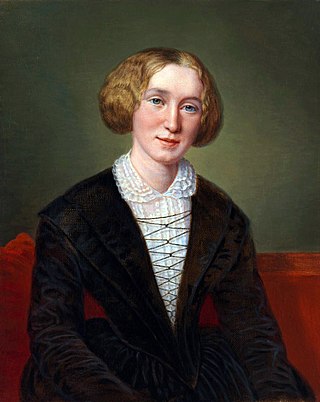
Mary Ann Evans, known by her pen name George Eliot, was an English novelist, poet, journalist, translator, and one of the leading writers of the Victorian era. She wrote seven novels: Adam Bede (1859), The Mill on the Floss (1860), Silas Marner (1861), Romola (1862–1863), Felix Holt, the Radical (1866), Middlemarch (1871–1872) and Daniel Deronda (1876). As with Charles Dickens and Thomas Hardy, she emerged from provincial England; most of her works are set there. Her works are known for their realism, psychological insight, sense of place and detailed depiction of the countryside. Middlemarch was described by the novelist Virginia Woolf as "one of the few English novels written for grown-up people" and by Martin Amis and Julian Barnes as the greatest novel in the English language.
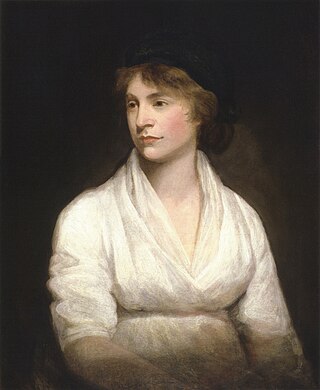
Mary Wollstonecraft was a British writer, philosopher, and advocate of women's rights. Until the late 20th century, Wollstonecraft's life, which encompassed several unconventional personal relationships, received more attention than her writing. Wollstonecraft is regarded as one of the founding feminist philosophers, and feminists often cite both her life and her works as important influences.
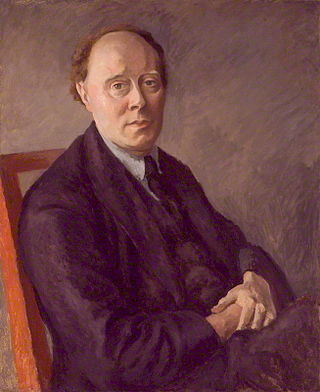
Arthur Clive Heward Bell was an English art critic, associated with formalism and the Bloomsbury Group. He developed the art theory known as significant form.

Dame Antonia Susan Duffy, known professionally by her former married name, A. S. Byatt, was an English critic, novelist, poet and short-story writer. Her books have been translated into more than thirty languages.

Chatto & Windus is an imprint of Penguin Random House that was formerly an independent book publishing company founded in London in 1855 by John Camden Hotten. Following Hotten's death, the firm would reorganize under the names of his business partner Andrew Chatto and poet William Edward Windus. The company was purchased by Random House in 1987 and is now a sub-imprint of Vintage Books within the Penguin UK division.
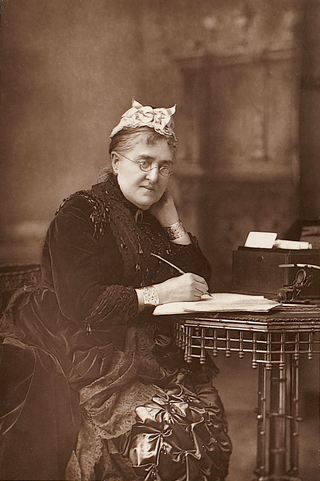
Eliza Lynn Linton was the first female salaried journalist in Britain and the author of over 20 novels. Despite her path-breaking role as an independent woman, many of her essays took a strong anti-feminist slant.

Thomas Taylor was an English translator and Neoplatonist, the first to translate into English the complete works of Aristotle and of Plato, as well as the Orphic fragments.
Dame Hermione Lee is a British biographer, literary critic and academic. She is a former President of Wolfson College, Oxford, and a former Goldsmiths' Professor of English Literature in the University of Oxford and Professorial Fellow of New College. She is a Fellow of the British Academy and of the Royal Society of Literature.

Angelica Vanessa Garnett, was a British writer, painter and artist. She was the author of the memoir Deceived with Kindness (1984), an account of her experience growing up at the heart of the Bloomsbury Group.
Mary Hays (1759–1843) was an autodidact intellectual who published essays, poetry, novels and several works on famous women. She is remembered for her early feminism, and her close relations to dissenting and radical thinkers of her time including Robert Robinson, Mary Wollstonecraft, William Godwin and William Frend. She was born in 1759, into a family of Protestant dissenters who rejected the practices of the Church of England. Hays was described by those who disliked her as 'the baldest disciple of [Mary] Wollstonecraft' by The Anti Jacobin Magazine, attacked as an 'unsex'd female' by clergyman Robert Polwhele, and provoked controversy through her long life with her rebellious writings. When Hays's fiancé John Eccles died on the eve of their marriage, Hays expected to die of grief herself. But this apparent tragedy meant that she escaped an ordinary future as wife and mother, remaining unmarried. She seized the chance to make a career for herself in the larger world as a writer.
Gilbert Imlay was an American businessman, author, and diplomat.
Norah Evelyn Smallwood OBE was an English publisher.
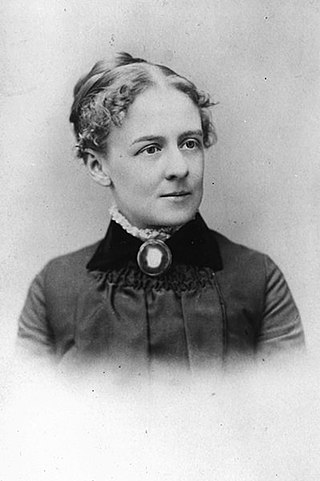
Charlotte Champe Eliot, was an American school teacher, poet, biographer, and social worker. She was the mother of T. S. Eliot, a famous poet, editor and literary critic, wife of Henry Ware Eliot, who ran the Hydraulic Press Brick Company in St. Louis, Missouri, and daughter-in-law of William Greenleaf Eliot, a leading minister in St. Louis and a founder of Washington University in St. Louis.

Thoughts on the education of daughters: with reflections on female conduct, in the more important duties of life is the first published work of the British feminist Mary Wollstonecraft. Published in 1787 by her friend Joseph Johnson, Thoughts is a conduct book that offers advice on female education to the emerging British middle class. Although dominated by considerations of morality and etiquette, the text also contains basic child-rearing instructions, such as how to care for an infant.

The Revolution Controversy was a British debate over the French Revolution from 1789 to 1795. A pamphlet war began in earnest after the publication of Edmund Burke's Reflections on the Revolution in France (1790), which defended the House of Bourbon, the French aristocracy, and the Catholic Church in France. Because he had supported the American Patriots in their rebellion against Great Britain, Burke's views sent a shockwave through the British Isles. Many writers responded to defend the French Revolution, such as Thomas Paine, Mary Wollstonecraft and William Godwin. Alfred Cobban calls the debate that erupted "perhaps the last real discussion of the fundamentals of politics" in Britain. The themes articulated by those responding to Burke would become a central feature of the radical working-class movement in Britain in the 19th century and of Romanticism. Most Britons celebrated the storming of the Bastille in 1789 and believed that The Kingdom of France should be curtailed by a more democratic form of government. However, by December 1795, after the Reign of Terror and the War of the First Coalition, few still supported the French cause.

Vivienne Haigh-Wood Eliot was the first wife of American-British poet T. S. Eliot, whom she married in 1915, less than three months after their introduction by mutual friends, when Vivienne was a governess in Cambridge and Eliot was studying at Oxford.
Charlotte Gordon is an American writer, distinguished professor of humanities at Endicott College, and winner of the National Book Critics Circle Award in nonfiction for her book Romantic Outlaws: The Extraordinary Lives of Mary Wollstonecraft and Mary Shelley (2015). Awarded a grant from the National Endowment for the Humanities, she is the director of The Tadler Center at Endicott College.
Claire Harman is a British literary critic and book reviewer who has written for the Times Literary Supplement, Literary Review, Evening Standard, the Sunday Telegraph and other publications. Harman is a fellow of the Royal Society of Literature, and has taught English at the Universities of Oxford and Manchester. She has taught creative writing at Columbia University, and been Professor of Creative Writing at Durham University since 2016.

Emily Hale was an American speech and drama teacher, who was the longtime muse and confidante of the poet T. S. Eliot. There were 1,131 letters from Eliot to Hale deposited in Princeton University Library in 1956; they were made accessible to the public on January 2, 2020.